 Petzlover
Petzlover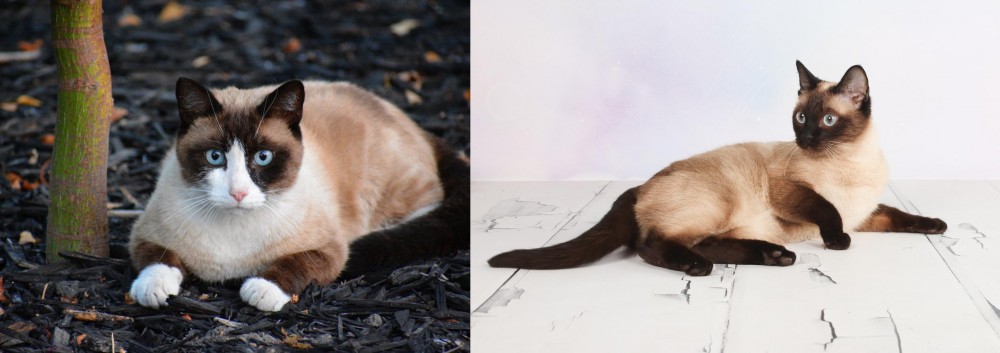 Snowshoe is originated from United States but Thai is originated from Thailand. Both Snowshoe and Thai are having almost same weight. Snowshoe may live 5 years less than Thai. Both Snowshoe and Thai has same litter size. Both Snowshoe and Thai requires Low Maintenance.
Snowshoe is originated from United States but Thai is originated from Thailand. Both Snowshoe and Thai are having almost same weight. Snowshoe may live 5 years less than Thai. Both Snowshoe and Thai has same litter size. Both Snowshoe and Thai requires Low Maintenance.
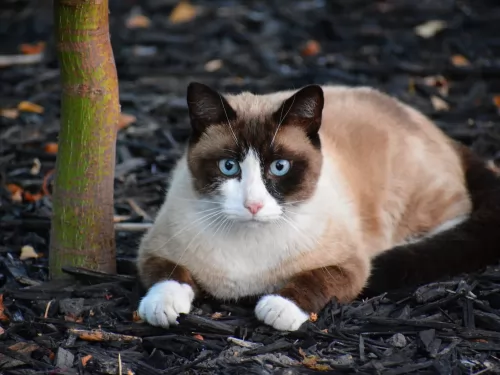 The Snowshoe is a short-haired, natural breed of cat. It is a bit similar in looks to the Siamese cat.
The Snowshoe is a short-haired, natural breed of cat. It is a bit similar in looks to the Siamese cat.
It was in the late 1960's that Dorothy Hinds-Daugherty from the USA devoted her time to developing a breed which was a mix of Siamese cat and American Shorthair. There was much enthusiasm for the new breed – the mesmerizing blue eyes and the lean, lithe, athletic body, .
This rare cat has been approved for championship status. In 1982 the Snowshoe was approved for championship status by the CFF and later by the American Cat Fanciers Association in 1990.
This beautiful cat has strict standards laid down for breeding.
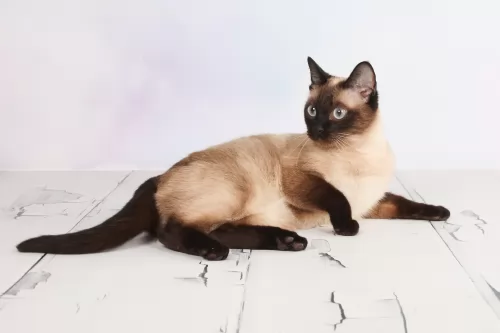 The Thai cat is also referred to as the Wichien Maat. It is an old cat breed descended from the cats of Thailand.
The Thai cat is also referred to as the Wichien Maat. It is an old cat breed descended from the cats of Thailand.
The Wichienmaat is a cat that was spoken of already centuries ago in a book. Over the years, the cat has remained much the same as its original breeding. Today this cat is popular in Thailand.
It was in the late 1800s that the Wichienmaat was imported to the West by British cat breeders, and the cats became known as ‘Siamese’.
Western breeders wanted to add in some other qualities to the cat and through selective breeding, they developed a finer-boned type of Siamese cat. Today some people refer to these cats as Old-Style Siamese, while others refer to them as Thais, but they are one and the same.
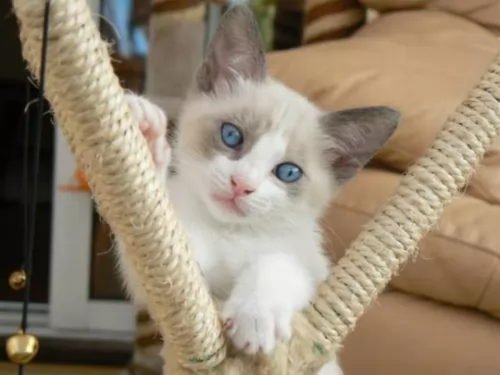 The Snowshoe is a medium-sized cat, with the body being longer than many other cat breeds.
The Snowshoe is a medium-sized cat, with the body being longer than many other cat breeds.
A distinctive feature with him is the white paws.
The cat can weigh between 5 to 7 kg. The legs of the cat are long and strong and the medium-length tail gradually tapers to a tip. The ears are fairly large with rounded tips. The smooth, short coat is white, brown, tan, and black and without an undercoat. He reminds you of a sweet treat - hints of chocolate and coffee shades with vanilla or light cream. He is pure white at birth, but after a few weeks, the coat undergoes a significant color change.
The face, ears, tail, and legs are darker in color than the rest of the body. The eyes of all Snowshoe cats are a sky blue.
Snowshoes are friendly, docile, and affectionate. They lap up the company of their human family, getting on well with children and other pets. They tend to be shy of strangers.
The Snowshoe is a fairly vocal cat and will let you know when he is hungry or he just wants to talk to you.
These cats are intelligent too and he can be taught a few tricks. He is very sociable and doesn’t like to be left on his own for long periods of time. Ideally, these cats should have a constant companion. They are active cats and like to be busy. You’ll need to spend some time with your Snowshoe as these cats love fun and games.
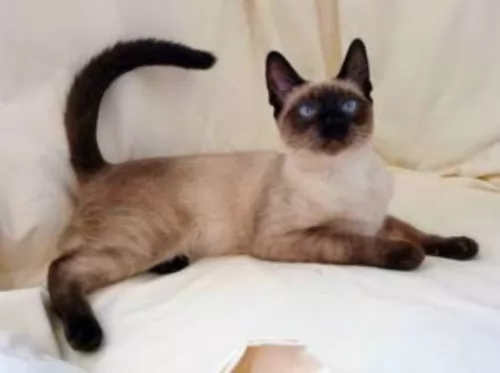 The Thai is a short-haired, glossy cat and comes in a variety of colors but no white.
The Thai is a short-haired, glossy cat and comes in a variety of colors but no white.
The soft, silky fur is a warm cream shade, much like the Siamese, with dark brown, black, smoky colored extremities.
The Thai is considered to be a medium-sized cat and he will weigh between 3 an 6kg. The body is lean, slender and muscular, the ears medium size with rounded tips and set wide apart. The eyes are are beautiful blue, large and slightly slanted.
Thai cats are curious, active, and intelligent. They are also social and vocal and are able to communicate to their human owners what they want.
They thrive on getting lots of attention from their humans and will even follow them around the house. They do well with children in the home when the children have been taught to be kind and respectful to animals.
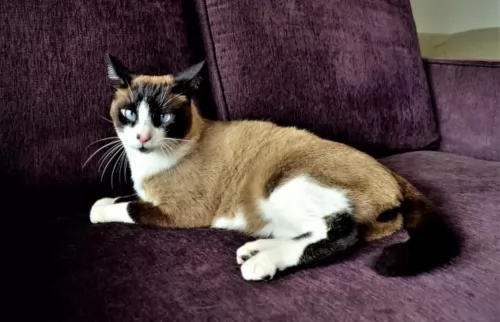 People who have already owned Snowshoes will tell you that they make splendid pets. They’re loyal and devoted to their human family, usually choosing a favorite person.
People who have already owned Snowshoes will tell you that they make splendid pets. They’re loyal and devoted to their human family, usually choosing a favorite person.
The fact that the Snowshoe is social and becomes so attached to people, makes him an awesome pet but just because he is fairly docile and amicable doesn’t mean he should be left alone for hours at a time. You’ll hear him voicing his displeasure at this.
He is certainly not a solitary cat, but an affectionate and most extraordinary cat.
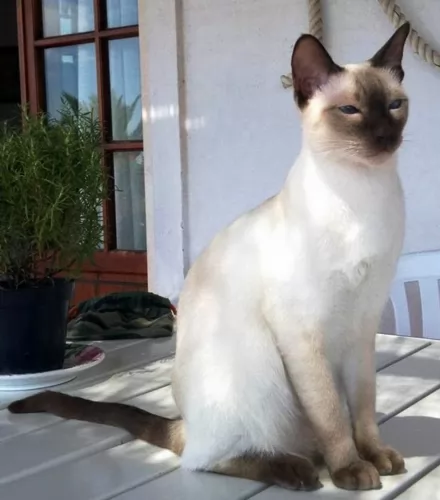 The Thai cat is social and friendly and enjoys time spent with his human family. They don’t like to be left alone for long periods of time and it just might be a good idea to have a feline friend for this cat.
The Thai cat is social and friendly and enjoys time spent with his human family. They don’t like to be left alone for long periods of time and it just might be a good idea to have a feline friend for this cat.
He is also a vocal cat and lets you know his feelings and certainly when he wants his food. The Thai wants to be your friend and companion and he will thrive in any kind of home when he is made to feel important and loved.
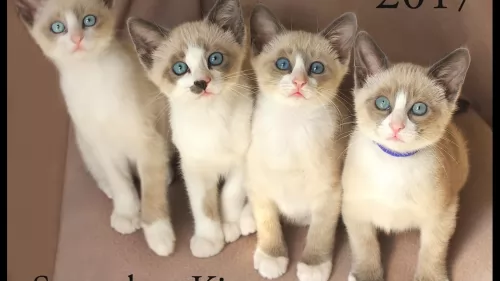 Your Snowshoe may well be a healthy breed, but every cat is prone to some illnesses. We look at some cat diseases you need to be aware of -
Your Snowshoe may well be a healthy breed, but every cat is prone to some illnesses. We look at some cat diseases you need to be aware of -
This is a feline disease found more often in Siamese cat breeds. The cat develops this protein disease between 1 TO 5 years of age. Amyloidosis is when there is an abnormal deposit of the protein complex amyloid into the liver, spleen and kidneys, resulting in bacterial infections, inflammation, and cancer.
Your Snowshoe’s teeth are particularly prone to gingivitis which is inflammation of the gums. It can lead to more serious conditions if left unattended. Other dental problems to watch for are bleeding gums, broken teeth, and swelling of the gums.
Have your Snowshoe spayed or neutered. Spaying or neutering decreases the likelihood of some cancers. Both males and females are less likely to roam too, making them more domesticated. The cat is less likely to spray urine as a territorial gesture too. Spaying or neutering is imperative if you want to avoid your cats being parents.
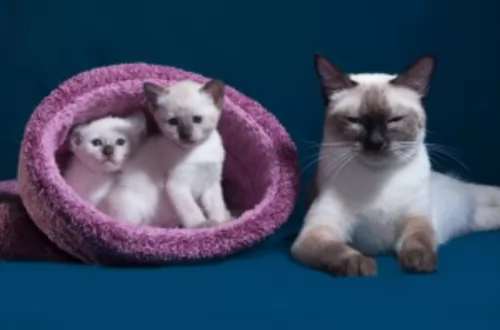 These cats are known for their good health. Just because he is considered healthy, you can't ignore looking out for signs that he may be in distress.
These cats are known for their good health. Just because he is considered healthy, you can't ignore looking out for signs that he may be in distress.
There are actually a whole lot of common cat illnesses your cat could succumb to, so you want to be sure you recognize some of the signs such a vomiting, diarrhea, lethargy, and battling to urinate. Make sure that the eyes are always bright and clear and that he is his active self.
Have your Thai cat vaccinated against the deadly cat diseases that there are. You will also need to have your cat dewormed. Speak to your vet about the best way to prevent fleas.
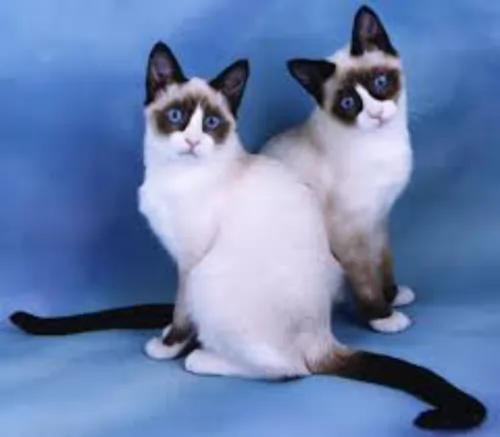 Provide your Snowshoe with the best cat food that there is. Always be aware of excess weight with your cat and avoid it at all costs. Extra weight is an influential factor in the development of diseases such as diabetes and arthritis.
Provide your Snowshoe with the best cat food that there is. Always be aware of excess weight with your cat and avoid it at all costs. Extra weight is an influential factor in the development of diseases such as diabetes and arthritis.
A proper diet for your Snowshoe will ensure that your vet expenses are less. The nutritional needs of your Snowshoe will be protein, minerals, vitamins, fatty acids, and enzymes. Your cat is a carnivore and his food needs to be high in meat and protein. He isn't going to require any carbohydrates. Speak to your vet about the best food for your feline friend.
Provide your Snowshoe with a constant supply of fresh, cool water.
Your Snowshoe will appreciate some cooked meat once in a while. Some tasty tuna now and then which is rich in omega-3s will also go down well.
Cats are fastidious about cleanliness so ensure his litter box is always clean. Scoop out the feces every day.
The Snowshoe has a low maintenance short coat, and a weekly brush will keep his coat shiny and glossy and he’ll love the attention this brushing session provides.
Cats like to scratch, so provide your Snowshoe with a scratching post as this will save your furniture from being used as a scratching post.
The Snowshoe cat is regarded as a low maintenance cat in terms of his short coat which needs to be brushed once a week. Brushing the hair will remove dead, loose hair and distribute skin oils to keep the coat in tip-top condition.
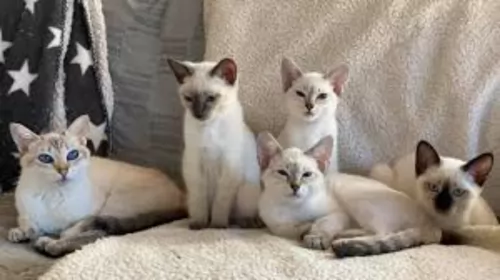 You’ll see your Thai cat preening and grooming, but he will still need to have the silky coat brushed gently to keep it shiny and healthy.
You’ll see your Thai cat preening and grooming, but he will still need to have the silky coat brushed gently to keep it shiny and healthy.
The brushing will make him happy as he just loves the attention, and it is good for the cat’s fur – to remove dust and loose hairs.
Your Thai cat is a scratcher just like any other cat, and if you don’t want to have your furniture scratch, invest in a scratching post.
Examine the inside of your cat’s ears to make sure they are clear of dirt and wax that could cause infection.
Some people say you should brush your cat’s teeth, but this can be too traumatic for your cat. Pets have always done well without their teeth being brushed. It can frighten your cat so much, he’ll want to scratch you.
Your Thai is an active, energetic cat, and you will want to provide him with a cat tree for climbing.
Provide your cat with feeding- and drinking bowls, litter box, warm, soft bed and toys to keep him occupied. It is always a good idea to put a collar on your pet and an ID disc in case he runs away.